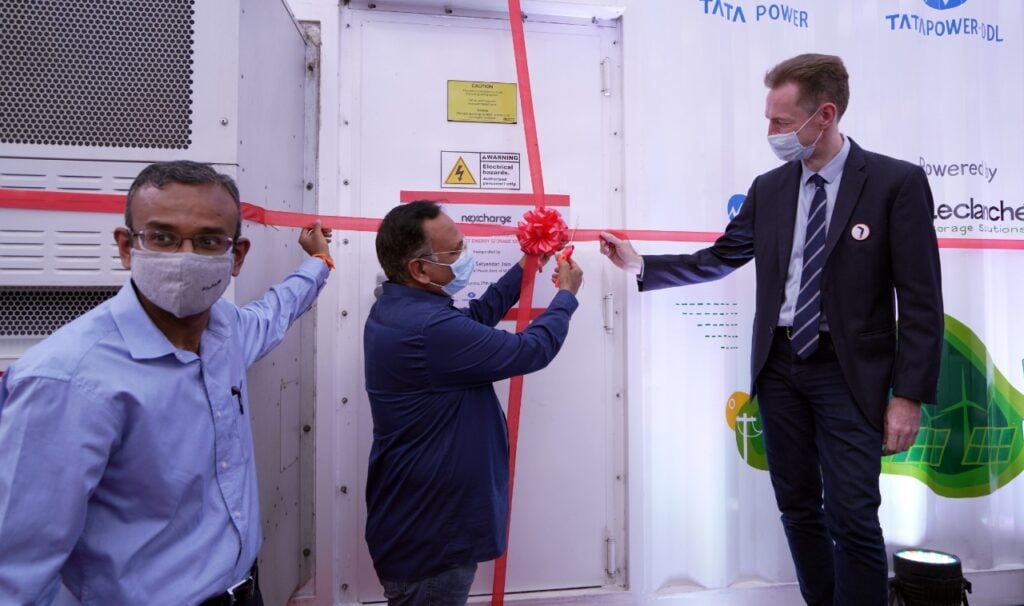
The Asian Development Bank (ADB) is providing financing to Tata Power Delhi Distribution Limited towards a 10MWh battery storage pilot project in Delhi, India.
Expected to be the first-ever grid-scale battery energy storage system (BESS) project on the distribution transformer level in South Asia, it will be used as a proof of concept (POC) and demonstrate how Tata Power Delhi Distribution Limited (Tata Power DDL) can deploy a further 50MWh of BESS capacity.
Enjoy 12 months of exclusive analysis
- Regular insight and analysis of the industry’s biggest developments
- In-depth interviews with the industry’s leading figures
- Annual digital subscription to the PV Tech Power journal
- Discounts on Solar Media’s portfolio of events, in-person and virtual
To that end, the ADB will administer a US$2 million grant, provided by investment bank Goldman Sachs together with the Climate Innovation and Development Fund (CIDF) of Bloomberg Philanthropies. The funds will partially finance the pilot BESS’ purchase and integration to the network.
“Power distribution is a crucial link in the electricity supply chain, and at times one of the most vulnerable,” Suzanne Gaboury, ADB director general for private sector operations said.
“Mainstreaming a battery energy storage system at the distribution transformer level will better integrate renewable energy sources and contribute to a more disaster-resilient power distribution system for Delhi.”
The announcement, made yesterday (10 April) by the bank, comes alongside a wider package of support to support the major city’s electricity distribution network infrastructure through the commissioning of a new 66/11kV grid, augmentation and expansion of transformers and substations, as well as other work including the rollout of smart meter technology.
That will come from a separate senior secured financing, made available through an agreement between ADB and Tata Power’s distribution arm to subscribe to non-convertible debentures worth around US$18.2 million.
Parent company Tata Power was behind India’s first-ever grid-scale BESS of any kind, a 10MW/10MWh system also in Delhi, supplied by Fluence and inaugurated in 2019.
Tata Power DDL, which is jointly-owned by the power company and the Delhi state government, connected a BESS to its distribution network in 2021, described as India’s first grid-connected community energy storage system. However at 150kWh/528kWh, it is considerably smaller than the pilot for which the Goldman Sachs-Bloomberg Philanthropies grant has been confirmed.
“The battery energy storage system plays a crucial role in building a resilient grid and paves the way for a future-ready power distribution network,” Tata Power CEO and managing director Dr Praveer Sinha said, adding that the grant, “will enable us in ensuring high-quality power supply for consumers and help integrate clean energy into the power supply mix”.
Various different assessments have been given on how much energy storage India needs, in order to integrate its ongoing adoption of renewable energy while maintaining stability and security of electricity supply, as well as achieving complementary aims like bringing electrification to rural areas.
For instance, the national Central Electricity Authority (CEA) said there was a need for 27GW/108GWh of battery storage alongside just over 10GW of pumped hydro energy storage (PHES) by 2029-2030, while the India Energy Storage Alliance (IESA) has forecast the need for about 160GWh of energy storage by the end of this decade.
Meanwhile, with India’s Ministry of Power targeting for battery capacity to be equivalent to 4% of India’s total electricity consumption by 2030, that equates to about 180GWh of battery storage being needed by that time, ADB said.
The national Union Government has backed energy storage with the introduction of tenders through agencies such as the Solar Energy Corporation of India (SECI) and recently pledged “viability gap funding” for 4,000MWh of storage in the current fiscal budget.
Energy-Storage.news’ publisher Solar Media will host the 1st Energy Storage Summit Asia, 11-12 July 2023 in Singapore. The event will help give clarity on this nascent, yet quickly growing market, bringing together a community of credible independent generators, policymakers, banks, funds, off-takers and technology providers. For more information, go to the website.






